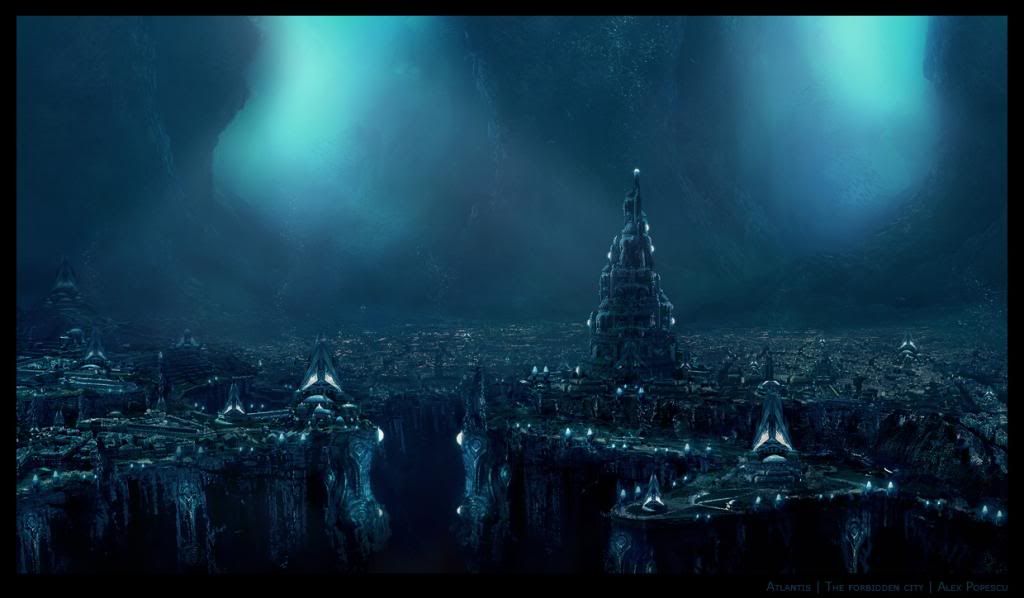This is a sort of pendant to the previous posting about Artemidorus. I would have included it there but that would have made a fairly long post into a longer one, and given the esoteric subject I felt it might discourage readership.
"The smartest men and women of antiquity were no stupider than we are," I said.
We underestimate the cultural achievements of the past because so much of the evidence for them has been destroyed through war, vandalism, and the deterioration inflicted by time.
Rendering of the interior of the ancient library of Alexandria
The famous collection of Pisistratus in Athens (sixth century B.C.) was ravaged. ... The papyri of the library of the temple of Ptah in Memphis were totally destroyed. The same fate befell the library of Pergamus in Asia Minor containing 200,000 volumes. The city of Carthage, razed to the ground by the Romans in a seventeen-day fire in 146 B.C., was said to possess a library with half a million volumes.These figures may be exaggerated -- the ancients were impressed by big numbers almost as much as today's journalists. But the cultural devastation was almost certainly immense.
But the greatest blow to history was the burning of the Alexandrian library in the Egyptian campaign of Julius Caesar during which 700,000 priceless scrolls were irretrievably lost. The Bruchion contained 400,000 books and the Serapeum 300,000. There was a complete catalogue of authors in 120 volumes with a brief biography of each author.
The Roman conqueror was also responsible for the loss of thousands of scrolls in the Bibracte druid college at what is now Autun, France. Numerous treatises on philosophy, medicine, astronomy, and other sciences perished there.And all this is only from the relatively recent past, archeologically speaking. What knowledge did mankind possess in far more ancient ages?
The fate of libraries was no better in Asia, as Emperor Tsin Shi Hwang-ti issued an edict whereby innumerable books were burned in China in 213 B.C. Leo Isaurus was another archenemy of culture as 300,000 books went to the incendiary in Constantinople in the eighth century.
Library of Alexandria reconstruction image
Everyone has heard of the story told by Plato about Solon, the Greek statesman who had lived about two centuries earlier. Solon supposedly went to Egypt where he learned from the priests about the island of Atlantis, said to have been destroyed around 9600 B.C. But even that was comparatively a short while ago in the prehistory of the human race.
Estimates for the advent of the Cro-Magnons, our closest biological ancestors, vary widely. Circa 50,000 years ago is a commonly cited date, but paleo-anthropology is an extremely inexact science. Even if we accept for the sake of discussion 50,000 years ago, does it make sense that for 40,000 years people with more or less our biology and brains lived in caves and clubbed animals, and only a few thousand years ago began to develop civilization?
But, you may say, that's silly. If there were long-ago civilizations, why doesn't the scientific record offer evidence of them? Well, consider the huge gaps in our knowledge of history in the past 4,000 years. It's only by dumb luck that Homer's poems survived. Sophocles wrote dozens of plays that are forever lost, barring some astonishing archeological find. Et cetera.
25,000 B.C.? Maybe
Time is the great destroyer of evidence. Even the continents change shape. It's not hard to believe that what we would call advanced civilizations might have been entirely erased. Imagine, 20,000 years from now, historians struggling to understand what we were all about. All our buildings and infrastructure gone without a trace. No paintings or paper books left. Digital media corrupted and unreadable.
Tomas again:
According to Simplicius (sixth century A.D.) ancient Egyptians kept records of astronomical observations for 630,000 years. The archives of Babylon were 470,000 years old, with a remark that he did not believe this claim. Hipparchus (c. 190-125 B.C.) mentioned Assyrian chronicles stretching back for 270,000 years.... And a good deal more in the same vein.
The Egyptian priests told Herodotus in the fifth century B.C. that the sun had not always risen where it rose then. This implied that they had kept records of the precession of equinoxes, covering at least 26,000 years. ... The Byzantine historian George Syncellus said that the chronicles of the pharaohs had recorded all events for 36,525 years.
If these claims go beyond your belief threshold, I sympathize. They sound absurd. The numbers are very likely imprecise (which doesn't mean that they must be completely fictitious). Yet to return to where this posting began: humans in the distant past probably had the same proportion of wise men and fools that we do today. But they had a different knowledge base, and I wouldn't be quick to thoroughly dismiss it.





2 comments:
Interesting. Much of it sounds pretty plausible to me, and some of it sounds at least a little exaggerated. I'm not sure we can be sure that the earth's wobble, or precession-rate, is, or always has been, as constant as we might think, so dating something back by that method might be a problem. But I can sure believe that there is, or was, a large body of knowledge that was forever lost due to wars, natural disasters and other causes. There is probably more than we don't know than that we will ever know.
Terry,
We can be dubious about claims of priestly classes keeping records going back hundreds of thousands of years. But there is plenty of evidence that at the very beginning of our historical times, explorers and literary travelers were often told of cultural traditions or continuity that extended much further back.
It's hard to believe that, for instance, Plato just made up his account of Solon's visit to Egypt and learning of Atlantis. Herodotus enjoyed passing on a good tale, but as I recall from reading his history, he wasn't shy about adding disclaimers like "this is what they say, although I do not myself believe it."
Post a Comment